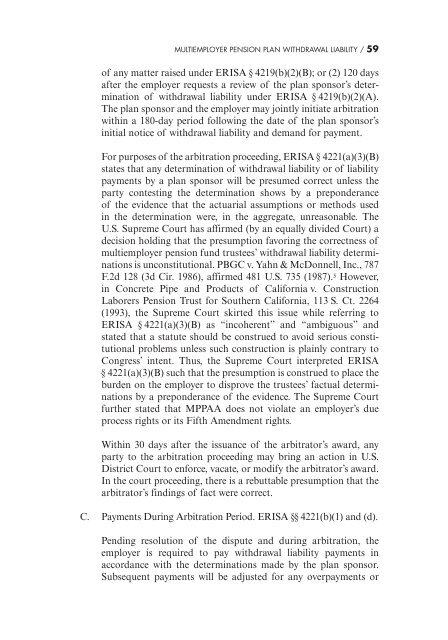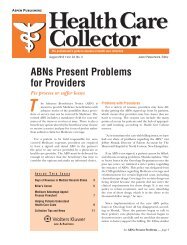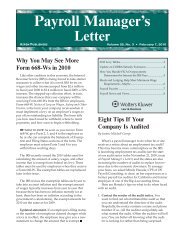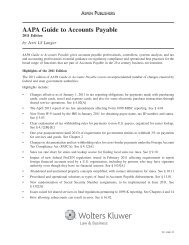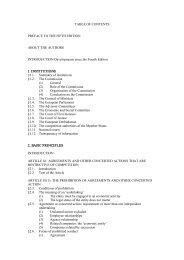journal of pension planning & compliance - Kluwer Law International
journal of pension planning & compliance - Kluwer Law International
journal of pension planning & compliance - Kluwer Law International
You also want an ePaper? Increase the reach of your titles
YUMPU automatically turns print PDFs into web optimized ePapers that Google loves.
MULTIEMPLOYER PENSION PLAN WITHDRAWAL LIABILITY / 59<br />
<strong>of</strong> any matter raised under ERISA § 4219(b)(2)(B); or (2) 120 days<br />
after the employer requests a review <strong>of</strong> the plan sponsor’s determination<br />
<strong>of</strong> withdrawal liability under ERISA § 4219(b)(2)(A).<br />
The plan sponsor and the employer may jointly initiate arbitration<br />
within a 180-day period following the date <strong>of</strong> the plan sponsor’s<br />
initial notice <strong>of</strong> withdrawal liability and demand for payment.<br />
For purposes <strong>of</strong> the arbitration proceeding, ERISA § 4221(a)(3)(B)<br />
states that any determination <strong>of</strong> withdrawal liability or <strong>of</strong> liability<br />
payments by a plan sponsor will be presumed correct unless the<br />
party contesting the determination shows by a preponderance<br />
<strong>of</strong> the evidence that the actuarial assumptions or methods used<br />
in the determination were, in the aggregate, unreasonable. The<br />
U.S. Supreme Court has affirmed (by an equally divided Court) a<br />
decision holding that the presumption favoring the correctness <strong>of</strong><br />
multiemployer <strong>pension</strong> fund trustees’ withdrawal liability determinations<br />
is unconstitutional. PBGC v. Yahn & McDonnell, Inc., 787<br />
F.2d 128 (3d Cir. 1986), affirmed 481 U.S. 735 (1987). 5 However,<br />
in Concrete Pipe and Products <strong>of</strong> California v. Construction<br />
Laborers Pension Trust for Southern California, 113 S. Ct. 2264<br />
(1993), the Supreme Court skirted this issue while referring to<br />
ERISA § 4221(a)(3)(B) as “incoherent” and “ambiguous” and<br />
stated that a statute should be construed to avoid serious constitutional<br />
problems unless such construction is plainly contrary to<br />
Congress’ intent. Thus, the Supreme Court interpreted ERISA<br />
§ 4221(a)(3)(B) such that the presumption is construed to place the<br />
burden on the employer to disprove the trustees’ factual determinations<br />
by a preponderance <strong>of</strong> the evidence. The Supreme Court<br />
further stated that MPPAA does not violate an employer’s due<br />
process rights or its Fifth Amendment rights.<br />
Within 30 days after the issuance <strong>of</strong> the arbitrator’s award, any<br />
party to the arbitration proceeding may bring an action in U.S.<br />
District Court to enforce, vacate, or modify the arbitrator’s award.<br />
In the court proceeding, there is a rebuttable presumption that the<br />
arbitrator’s findings <strong>of</strong> fact were correct.<br />
C. Payments During Arbitration Period. ERISA §§ 4221(b)(1) and (d).<br />
Pending resolution <strong>of</strong> the dispute and during arbitration, the<br />
employer is required to pay withdrawal liability payments in<br />
accordance with the determinations made by the plan sponsor.<br />
Subsequent payments will be adjusted for any overpayments or


